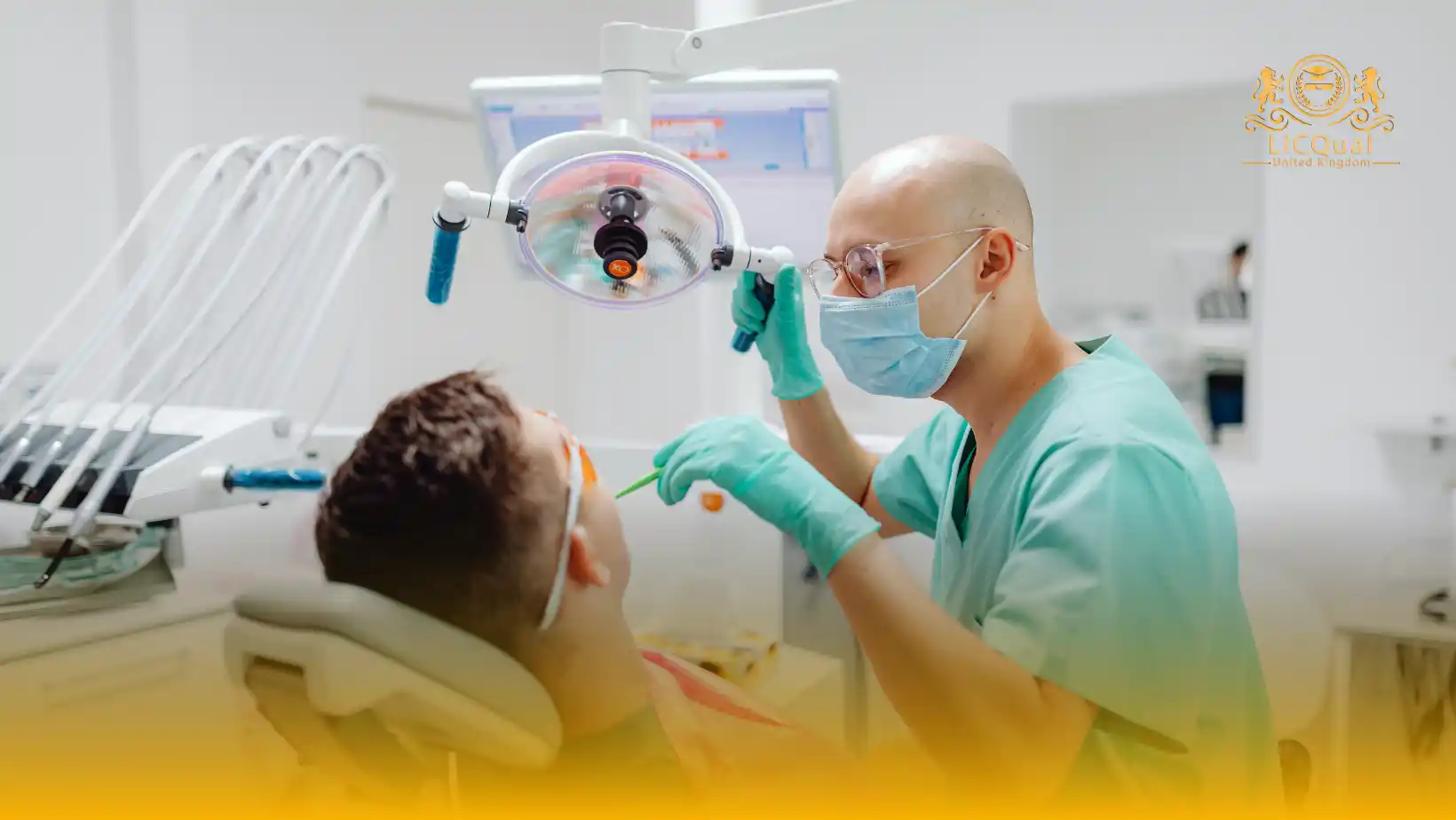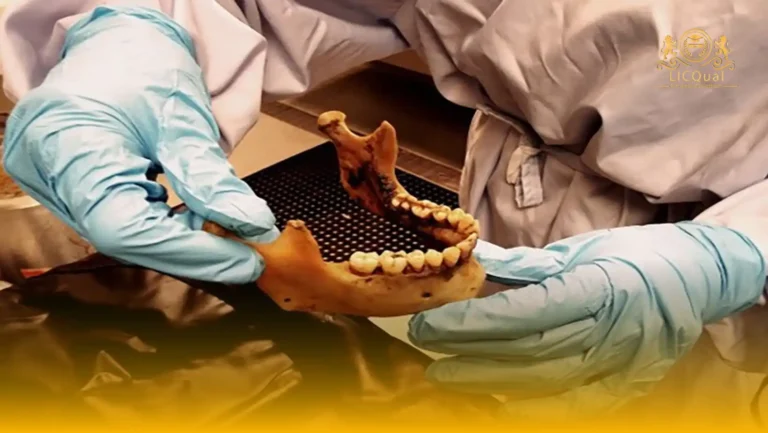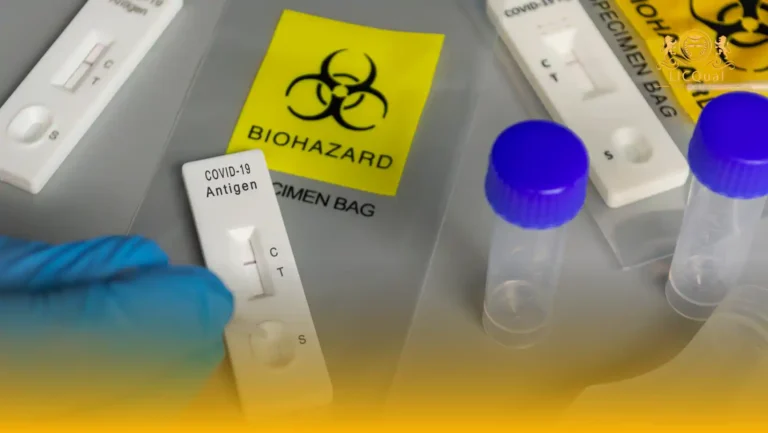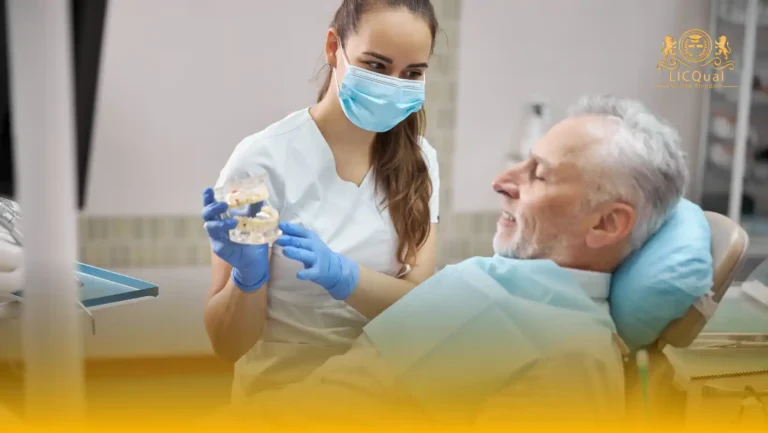The LICQual Level 7 Postgraduate Diploma in Aesthetic Dentistry (PgD Aesthetic Dentistry) is an advanced, professionally focused qualification designed for experienced dental practitioners who wish to specialise in aesthetic and cosmetic dental procedures. This programme provides learners with in-depth knowledge, technical expertise, and clinical skills required to deliver high-quality aesthetic dental care, combining artistry with evidence-based practice.
This qualification is not intended for fresh learners; it is specifically aimed at practising dental professionals seeking to enhance their career prospects, broaden their clinical competencies, and strengthen their Continuing Professional Development (CPD) portfolio. Learners will explore advanced concepts in smile design, restorative aesthetics, minimally invasive cosmetic techniques, and the use of modern materials and technologies in aesthetic dentistry.
The programme blends theoretical study with practical application, ensuring learners develop the confidence and competence to perform complex aesthetic procedures safely and effectively. Emphasis is placed on patient assessment, treatment planning, clinical execution, and the ethical considerations involved in cosmetic dentistry.
By completing the PgD in Aesthetic Dentistry, learners will refine their skills in restorative and cosmetic techniques, improve patient satisfaction, and elevate the standard of care provided within their practice. This qualification supports professional growth, enhances career opportunities, and enables learners to contribute to advancements in aesthetic dentistry, positioning them as specialists in this increasingly sought-after field of dental practice.
Course Overview
Qualification Title
LICQual Level 7 Postgraduate Diploma in Aesthetic Dentistry (PgD Aesthetic Dentistry)
Total Units
6
Total Credits
120
GLH
600
Qualification #
LICQ2200699
Qualification Specification
To enroll in the LICQual Level 7 Postgraduate Diploma in Aesthetic Dentistry (PgD Aesthetic Dentistry), applicants must meet the following criteria:
|
Qualification# |
Unit Title |
Credits |
GLH |
|---|---|---|---|
|
LICQ2200699-1 |
Principles of Aesthetic Dentistry |
20 |
100 |
|
LICQ2200699-2 |
Advanced Restorative Techniques |
20 |
100 |
|
LICQ2200699-3 |
Cosmetic Procedures and Material Selection |
20 |
100 |
|
LICQ2200699-4 |
Digital Dentistry and Smile Design |
20 |
100 |
|
LICQ2200699-5 |
Patient Management and Ethical Considerations in Aesthetic Dentistry |
20 |
100 |
|
LICQ2200699-6 |
Clinical Practice, Case Management, and Outcome Assessment |
20 |
100 |
By the end of this course, learners will be able to:
1. Principles of Aesthetic Dentistry
By the end of this unit, the learner will be able to:
- Critically analyse the fundamental concepts of aesthetic dentistry and smile design.
- Assess facial aesthetics and integrate them into patient-centred treatment planning.
- Apply evidence-based approaches to enhance clinical outcomes in aesthetic procedures.
- Evaluate the impact of aesthetic interventions on overall oral health and patient satisfaction.
2. Advanced Restorative Techniques
By the end of this unit, the learner will be able to:
- Demonstrate advanced restorative procedures including veneers, crowns, and bonding.
- Select appropriate restorative techniques based on clinical case requirements.
- Evaluate the longevity, function, and aesthetics of restorative outcomes.
- Integrate minimally invasive principles into restorative practice.
3. Cosmetic Procedures and Material Selection
By the end of this unit, the learner will be able to:
- Critically appraise cosmetic dental procedures and treatment options.
- Select appropriate materials for aesthetic outcomes, including ceramics, composites, and digital restorations.
- Apply material science principles to optimise clinical results.
- Evaluate the aesthetic and functional performance of different dental materials.
4. Digital Dentistry and Smile Design
By the end of this unit, the learner will be able to:
- Utilise digital tools and software for smile design and treatment planning.
- Integrate digital workflows into clinical practice to improve accuracy and efficiency.
- Analyse digital simulations to predict aesthetic outcomes.
- Critically evaluate the role of digital dentistry in modern aesthetic practice.
5. Patient Management and Ethical Considerations in Aesthetic Dentistry
By the end of this unit, the learner will be able to:
- Apply effective communication strategies to manage patient expectations.
- Evaluate ethical principles and apply them to aesthetic treatment decisions.
- Obtain informed consent in line with professional standards.
- Demonstrate patient-centred care in complex cosmetic dentistry cases.
6. Clinical Practice, Case Management, and Outcome Assessment
By the end of this unit, the learner will be able to:
- Conduct comprehensive assessments and develop personalised treatment plans.
- Apply advanced aesthetic techniques in clinical practice with precision and safety.
- Evaluate clinical outcomes and implement improvements based on reflective practice.
- Demonstrate competence in managing complex aesthetic cases within multidisciplinary teams.
The LICQual Level 7 Postgraduate Diploma in Aesthetic Dentistry (PgD Aesthetic Dentistry) is designed for dentists, dental specialists, and cosmetic dentistry professionals who want to enhance their skills in smile design, restorative techniques, and aesthetic treatments. This program is ideal for those seeking international recognition, advanced clinical expertise, and career progression in the field of aesthetic dentistry. Whether you are a practicing clinician, a recent graduate, or an academic, this course equips you with the knowledge, confidence, and professional credentials to excel in cosmetic and restorative dental practice.
1. Practicing Dentists Seeking Specialization in Aesthetic Dentistry
- Designed for licensed dentists aiming to expand into cosmetic and restorative dentistry.
- Provides advanced training in smile design and patient-centered aesthetic care.
- Enhances skills in composite restorations, veneers, and teeth whitening procedures.
- Strengthens diagnostic assessment and treatment planning capabilities.
- Offers globally recognized credentials for career advancement.
2. Dental Graduates and Early-Career Professionals
- Ideal for BDS, DDS, or equivalent graduates seeking postgraduate specialization.
- Builds foundational knowledge in aesthetic and restorative dental techniques.
- Prepares learners for higher studies such as Master’s-level cosmetic dentistry programs.
- Increases employability in private and international dental practices.
- Encourages adoption of evidence-based and innovative treatment approaches.
3. Cosmetic Dentistry Specialists
- Designed for dentists focusing on advanced aesthetic procedures.
- Provides exposure to complex smile makeovers and restorative challenges.
- Enhances clinical skills in veneer placement, bonding, and digital smile planning.
- Strengthens confidence in delivering high-quality cosmetic outcomes.
- Supports professional growth as a recognized aesthetic dentistry expert.
4. International Dental Professionals
- Tailored for practitioners seeking UK-accredited postgraduate qualifications.
- Offers flexible online study options accessible worldwide.
- Aligns with international standards in cosmetic and restorative dentistry.
- Provides recognition to support global career mobility and professional credibility.
- Enhances opportunities for teaching, consultancy, and leadership roles abroad.
5. Dental Educators and Academic Professionals
- Ideal for lecturers and trainers updating curriculum in cosmetic dentistry.
- Incorporates modern techniques and innovations into teaching.
- Supports academic leadership and research in aesthetic dental care.
- Enhances credibility as an expert in specialist cosmetic dentistry education.
- Provides opportunities for publications and case study contributions.
6. Clinic Owners and Practice Managers
- Helps owners expand cosmetic and restorative services in their practices.
- Provides knowledge to supervise aesthetic dental teams and procedures.
- Strengthens understanding of patient management and consultation strategies.
- Supports implementation of high-quality clinical standards.
- Promotes practice growth through advanced aesthetic services.
7. Career-Oriented Dental Professionals Seeking Recognition
- Designed for those aiming for internationally recognized aesthetic dentistry credentials.
- Enhances professional credibility in cosmetic and restorative dentistry.
- Opens pathways to advanced clinical, academic, and consultancy roles globally.
- Provides a foundation for long-term career progression in specialist dental practice.
- Equips professionals to excel in multidisciplinary and high-level clinical environments.
Centres delivering the LICQual Level 7 Postgraduate Diploma in Aesthetic Dentistry (PgD Aesthetic Dentistry) must meet the following criteria to ensure high-quality training, assessment, and learner support:
- Accreditation and Approval
- Must be an officially approved LICQual centre with valid accreditation to deliver Level 7 postgraduate dental qualifications.
- Centres should comply with LICQual’s quality assurance, assessment, and regulatory standards.
- Qualified and Experienced Staff
- Trainers and assessors must hold recognised qualifications in dentistry and aesthetic dentistry.
- Faculty should have substantial clinical experience in cosmetic and restorative procedures.
- Assessors must be trained in Level 7 assessment practices and internal verification processes.
- Facilities and Clinical Resources
- Access to modern clinical facilities equipped for aesthetic procedures, including restorative tools, digital imaging, and dental photography.
- Availability of materials and equipment for cosmetic dentistry, including ceramics, composites, and digital workflow tools.
- Compliance with health, safety, and infection control regulations.
- Learning Resources
- Provision of up-to-date academic materials, case studies, and access to professional journals.
- Digital platforms for interactive learning, simulations, and learner support.
- Assessment and Quality Assurance
- Systems for practical, written, and oral assessments in line with Level 7 standards.
- Maintenance of accurate learner records, assessment evidence, and internal verification documentation.
- Learner Support
- Academic and pastoral support throughout the programme.
- Guidance on CPD, professional development, and career progression in aesthetic dentistry.
These requirements ensure learners receive comprehensive, professional, and high-standard training in aesthetic dentistry, enabling them to achieve competence and excellence in this specialised field.
Assessment and Verification
All units within this qualification are subject to internal assessment by the approved centre and external verification by LICQual. The qualification follows a criterion-referenced assessment approach, ensuring that learners meet all specified learning outcomes.
To achieve a ‘Pass’ in any unit, learners must provide valid, sufficient, and authentic evidence demonstrating their attainment of all learning outcomes and compliance with the prescribed assessment criteria. The Assessor is responsible for evaluating the evidence and determining whether the learner has successfully met the required standards.
Assessors must maintain a clear and comprehensive audit trail, documenting the basis for their assessment decisions to ensure transparency, consistency, and compliance with quality assurance requirements.







